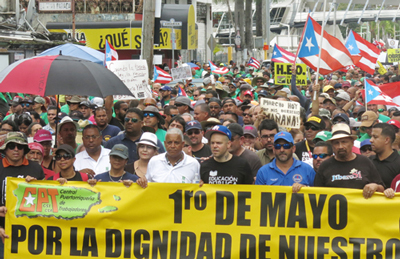
Vol. 81/No. 25 July 10, 2017
(front page)
Opponents of US colonial rule in Puerto Rico speak out at the UN

Participants welcomed longtime independence fighter Oscar López to the June 19 hearing. López was released from U.S. custody May 17 after nearly 36 years in jail for his actions opposing U.S. domination. Puerto Rico has been a U.S. colony since 1898, when Washington wrested control of the country from Spain.
The hearing took place as the U.S.-imposed Financial Oversight and Management Board — known in Puerto Rico as the Junta — continues to push the government there to make deeper and deeper cuts in public employee wages, pensions, health care and other services.
On May 1, tens of thousands of workers and unionists marched in San Juan and held a one-day strike to protest the Junta’s demands, in the largest labor action in some two decades.
López, the first speaker, was given 20 minutes, instead of the usual five, to address the committee. Puerto Rico has a “right to be an independent and sovereign nation,” he said.
“Everything the fiscal control board is doing is criminal,” López said, and its only purpose “is to squeeze every cent out of the pockets of every Puerto Rican on the island, and, if they could, of those in the diaspora,” to pay the debt.
López also denounced Washington’s pressures and threats against Venezuela. He called for an end to the U.S. embargo of Cuba and its occupation of Cuba’s territory of Guantánamo.
Speakers from a wide variety of groups and views from both Puerto Rico and the United States described the deep economic and social crisis on the island today and how U.S. colonial rule makes it worse.
“I come from an island of 3.5 million inhabitants, where 45 percent of its people live below the poverty level, where the unemployment rate is above 12 percent, where last year 99.5 percent of its population drank contaminated water, where the school drop-out rate is above 40 percent, where they are trying to close 170 public schools,” noted Joselyn Santos Valderrama, a leader of the Hostos Youth and students at the Inter-American University in Arecibo. “We need a radical change of course.”
Santos said students at the University of Puerto Rico went on strike for two months in response to government demands for drastic cuts in university funding.
The debt is the empire’s
“The debt is not ours. It’s the empire’s,” said Gerardo Lugo Segarra, speaking for the Nationalist Party of Puerto Rico. “It’s the United States that owes Puerto Rico for subjecting it to more than a century of exploitation, of experiments and of deaths.”
The U.S. fiscal board’s actions have become so unpopular that even the two main bourgeois parties that take turns running the colonial regime — the Popular Democratic Party (PPD) and the New Progressive Party (PNP) — have complained. At the hearing, Puerto Rico Secretary of State Luis Rivera Marín, representing the pro-statehood PNP administration, complained that the “undemocratic Junta has powers over the elected government. If this is not colonialism, then international law does not exist.”
At the same time, Rivera acknowledged that the Puerto Rican government “is working hard to meet the requirements and demands of this Junta.”
Rivera defended the June 11 non-binding plebiscite pushed through by Gov. Ricardo Rosselló despite a call for a boycott by virtually every other political party and trade unions on the island. He admitted that the wording of the plebiscite had been changed to meet the dictates of the U.S. Justice Department.
Even though only 500,000 people voted, barely 23 percent of those eligible, Rivera said the vote — 97 percent for statehood — was the “unequivocal choice of our people.” This is the fifth non-binding plebiscite since 1967 and the turnout this time was the lowest ever.
María de Lourdes Santiago, vice president of the Puerto Rican Independence Party, called the plebiscite a “farce,” noting that statehood would not be independence but “the annexation of Puerto Rico to the United States.”
Joselyn Velázquez from the Socialist Front pointed to the May Day protests, saying, “If the demands of the people are not met, the world should not doubt that our people will continue to struggle.”
In addition to representatives of organizations that back the fight for independence, there were also speakers from the Federation of Teachers of Puerto Rico, the New York State Nurses Association and the Professional Social Workers Guild of Puerto Rico.
Osborne Hart, Socialist Workers Party candidate for mayor of New York, who visited Puerto Rico last month to welcome Oscar López at his release from U.S. custody and to support the struggles of working people and youth there, told the hearing that “a successful struggle for Puerto Rico’s independence from Washington’s domination is also in the interest of working people in the United States.”
Building the fight by working people in Puerto Rico to take political power out of the hands of Washington and their capitalist allies on the island, Hart said, is the road to independence. He pointed to Cuba’s socialist revolution as an example for working people in Puerto Rico, the U.S. and around the world. (Hart’s statement is printed on this page.)
The U.N. committee approved a resolution initiated by the government of revolutionary Cuba, reaffirming “the inalienable right of the people of Puerto Rico to self-determination and independence.”
“Cuba will continue defending the legitimate right of the people of Puerto Rico to self-determination and independence,” Cuban Ambassador Ana Silvia Rodríguez said, “and will be at their side until final victory.”
Related articles:
NY Puerto Rican Parade welcomes Oscar López
‘Fight for workers power is road to independence’
Front page (for this issue) | Home | Text-version home